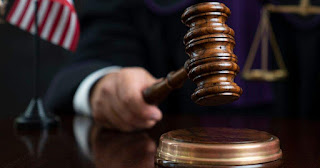The Injustice of Justice, the Judge A Reckoning With the Tyranny of One in the Name of Many
There is something haunting—almost theatrical—about the courtroom. The silence. The ritual. The polished floors, the heavy doors, the flags draped like holy relics behind the bench. And then there’s the judge, robed in solemn black, perched above the rest like some modern-day oracle of law. Not elected by the people. Not checked by a council. Alone.
And we call this democracy?
No. What we call justice is, in truth, often a performance of power. A monologue dressed as a dialogue. A solitary voice rendering judgment in a system supposedly built on the consent of the governed.
How did we get here?
How did we become a society that chants the virtues of collective will in the voting booth, only to whisper our fate into the hands of one in the courtroom?
Let’s not romanticize the robe. It does not sanctify. It obscures. Because beneath it is not a deity—but a person. A person with biases, beliefs, traumas, loyalties, blind spots. A person shaped by the same cultural tides that bend the rest of us. Yet we hand them the gavel and ask them to weigh the lives of others as if they were free from the gravity of being human.
This is not justice. This is judicial monarchy—camouflaged by ritual, defended by tradition, and tolerated by silence.
Yes, we tell ourselves the system has safeguards. Panels. Appeals. Precedent. But at its core, far too often, the system rests on a single mind, a single moment, a single ruling that can ripple through generations. And that should terrify us.
Because history has warned us—over and over—what happens when one person wields too much power. Kings and emperors. Popes and tyrants. Even the wisest among them fell to the seduction of singularity. Why should we expect judges—no matter how brilliant—to be any different?
And yet, we bow.
We stand when they enter. We call them “Your Honor” with the reverence once reserved for prophets. We strip juries of power, silence community input, and surrender to the illusion that the law, when passed through the lips of one, becomes sacred. But the truth is: law is not holy unless it is just. And justice is not just unless it is shared.
This is the paradox we must confront. A democracy that permits rule by one in its most sacred institution is not a democracy fully realized. It is a contradiction wearing a powdered wig.
Even in scripture, judgment was never meant to rest on one set of shoulders. Moses buckled under the weight and appointed seventy elders. Christ taught in community, not from a throne. Solomon, famed for his wisdom, still sought the counsel of others. Wisdom, in every tradition worth its salt, is not solitary. It is communal.
And yet, here we are—still entrusting life and death, liberty and dignity, to a system where one voice can decide for all.
Enough.
We must stop revering the singular and start reforming the structure. Expand panels. Empower juries. Build systems where dissent is not feared but foundational. Where judgment is not a decree, but a discourse. Where the bench is not a throne, but a table.
Because the courtroom should not be a cathedral of hierarchy—it should be a crucible of truth, forged by the friction of many minds, many voices, many lives.
Let me be clear: this is not an attack on judges. It is a call to liberate them—from the impossible expectation that one person can carry the weight of justice alone. No one should. No one can.
If democracy is the belief that power must be distributed to preserve dignity, then let us live by that belief—even here, where the stakes are highest. Let us build a justice system that mirrors the moral architecture of the society we claim to be: interdependent, diverse, and accountable to something higher than tradition—truth.
Because justice, real justice, does not wear a robe. It wears the faces of the people.
Let me know if you’d like this adapted for a specific publication, or with more citations, religious integration, or story-driven case examples woven in.





Comments
Post a Comment